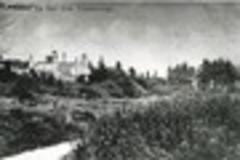 This is Sussex --
This is Sussex --SOME CALLED HIM a "hanging judge", for that was the ultimate penalty for murder in the 1930s.
But Sir Rigby Swift was a man who cared deeply for the welfare of those less fortunate than himself.
Unemployment was as rife in 1933 as it was in the late 1980s and 1990s.
In Crowborough, which then had a population of about 7,000, it was estimated that 300 men were out of work.
This was a situation which caused concern among wealthier residents, and they decided not to rely on the Government but to tackle the local problem themselves.
If everything had gone according to plan their efforts would have provided a swimming pool for the expanding town 50 years before the Goldsmiths Leisure Centre was built.
Sir Rigby PhilipWatson Swift, a senior King's Bench judge who lived at Kiona, a large house near the summit of Crowborough Beacon, presided over a public meeting at the Girl Guides' Hall – later to be Crowborough Community Centre – which resolved to make a determined attempt to alleviate the lot of the unemployed.
The meeting was told that the Marquess of Abergavenny had offered land at a nominal price, under certain conditions, for the provision of a swimming pool.
Crowborough and District Council of Christian Social Services also had a scheme under consideration.
The Marquess had offered to give his name as president of any organisation which might be formed to carry out a scheme to relieve the unemployed.
Crowborough architect Richard Ball said that the pool would measure 100 feet by 40, and that labour would account for half the cost, estimated at between £1,200 and £1,500.
Judge Swift, for that was how Crowborough knew him, drew laughter when he remarked that it was some time since he had asked people to vote for him (he was a former MP), but he was prepared to serve on the committee.
As he was one of the few men in Crowborough who never went out without his wife he said he would like her to be elected too.
This was done, and the meeting referred the pool scheme to a committee of which the Marquess was president.
The pool never materialised, but Judge Swift continued to be an influential champion of the unemployed, bringing their plight to the notice of Government ministers.
He was the first president of Crowborough Rugby Football Club, and as such his distinguished life has been researched by Crowborough historian John Hackworth for his history of the rugby club.
Sir Rigby was regarded as the most outspoken judge of his day, but he also had a keen sense of humour.
On a Derby Day , when the race was won by Midday Sun, he was presiding over a case when a note was quietly passed to him giving the result.
He interrupted the hearing, commenting that the Midday Sun was shining brightly.
On another occasion he was hearing a case involving an expensive fur coat, modelled in court by a very glamorous young lady. Judge Swift remarked on the attractiveness of the coat – and its contents.
The judge and his wife, Dame Martha-Beatrice Swift, gave much of their time to charitable causes and welfare issues in the Crowborough district. During the years of depression he chaired the Crowborough and District Unemployment Relief Committee, and Lady Swift was closely involved in supporting Crowborough Hospital and was instrumental in providing the town's first ambulance.
Both had hobbies. The judge kept pigs and poultry, and Lady Swift kept racing pigeons. They had been regular visitors to Crowborough since 1914, and in 1917 they settled at Kiona, a house with a 14-acre estate.
Born at St Helens, Lancashire, in 1874, Judge Swift was introduced to rugby at Parkfield School, Liverpool, and he also played at London University, where he graduated as a LlB, Bachelor of Laws.
He was called to the Bar in 1895, was later appointed Recorder of Wigan, and was Conservative MP for St Helens from 1910 to 1918. He became a High Court judge at the age of 46.
From the outset Judge Swift gave his whole-hearted support to Crowborough Rugby Club.
Its beginnings stemmed from a letter to the Kent and Sussex Courier at the end of 1936, written by founder-members Geoffrey Cornford and Roland Hill, which mentions the judge's "enormous help" in loaning a field on Beacon Road "which is assuredly the best possible ground in the district".
Judge Swift served as president of the club for only nine months. His presidency was abruptly terminated by his death in October 1937 at the age of 63. Lady Swift had died in April that year, and the judge was buried with her at Rotherfield.
Mr Hackworth quotes a friend who attended the funeral: " His multitudinous acts of kindness so readily and courteously bestowed upon all who claimed his sympathy and assistance should not be forgotten".
Judge Swift was a member of Crowborough Beacon Golf Club and was captain in 1920-21. He supported Crowborough and District Cricket League, and gave a silver challenge cup which bears his name.
Mr Hackworth has presented the Rugby Club with a copy of the manuscript for their archive records.
He is donating the proceeds of his forthcoming book, the result of three or more years of research, to help fund the new clubhouse. Reported by This is 15 hours ago.